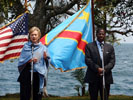
Well over a year has passed since Secretary of State Hillary Clinton visited eastern Congo, generating high expectations for the U.S. response to the long war there. In the year since, the links between the conflict and the illicit trade in minerals – which we all help perpetuate through our electronics purchases – is now widely acknowledged. Grassroots and Congressional advocacy has helped vault the issue from obscurity to the mainstream in the United States – or at least it’s well on its way there, most tangibly through the adoption of the U.S. conflict minerals legislation.
It’s time for Secretary Clinton to personally follow up.
“At rare moments during the course of a war, a confluence of factors come together to provide a window of opportunity for real conflict transformation,” wrote Enough’s John Prendergast in “Congo’s Enough Moment,” a new paper based on his recent travels in Central Africa.
Impressively, many of the pieces are in place for moving to end the war, but “what missing is a conductor to orchestrate the process”:
That missing conductor is the United States, and more specifically, its highest ranking official to travel to Congo and make it a priority: Secretary of State Hillary Clinton. Throughout my recent trip with traveling partner Ashley Judd, I kept hearing, “Hillary is key.” Secretary Clinton’s trip to eastern Congo a year ago provided hope because she went beyond simple sympathy and identified some of the core causes of the conflict, including conflict minerals, an unreformed army, a lack of accountability, and the need for an enhanced strategy to deal with the primarily Rwandan militia called the FDLR.
Prendergast’s 10-page report concisely describes the multiple drivers of conflict in Congo and how they link together, with the aim of showing how they can be tackled. “The time is ripe for a grand bargain to be struck among Congo, its neighbors, and the broader international community,” Prendergast wrote.
Read the full report Congo’s Enough Moment: The Case for Conflict Minerals Certification and Army Reform

